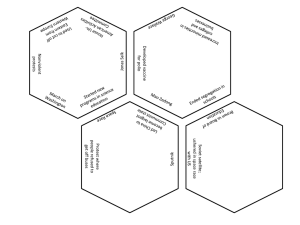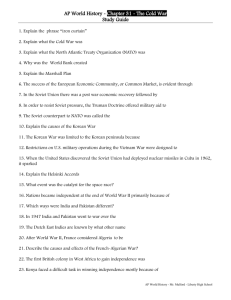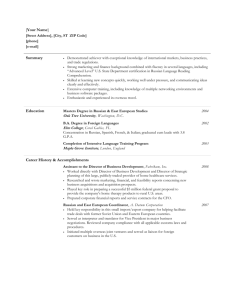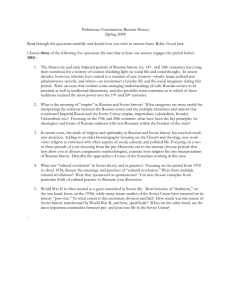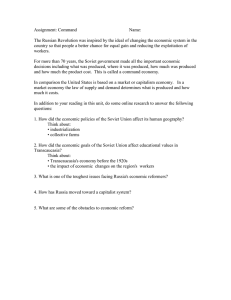Document 11257893
advertisement
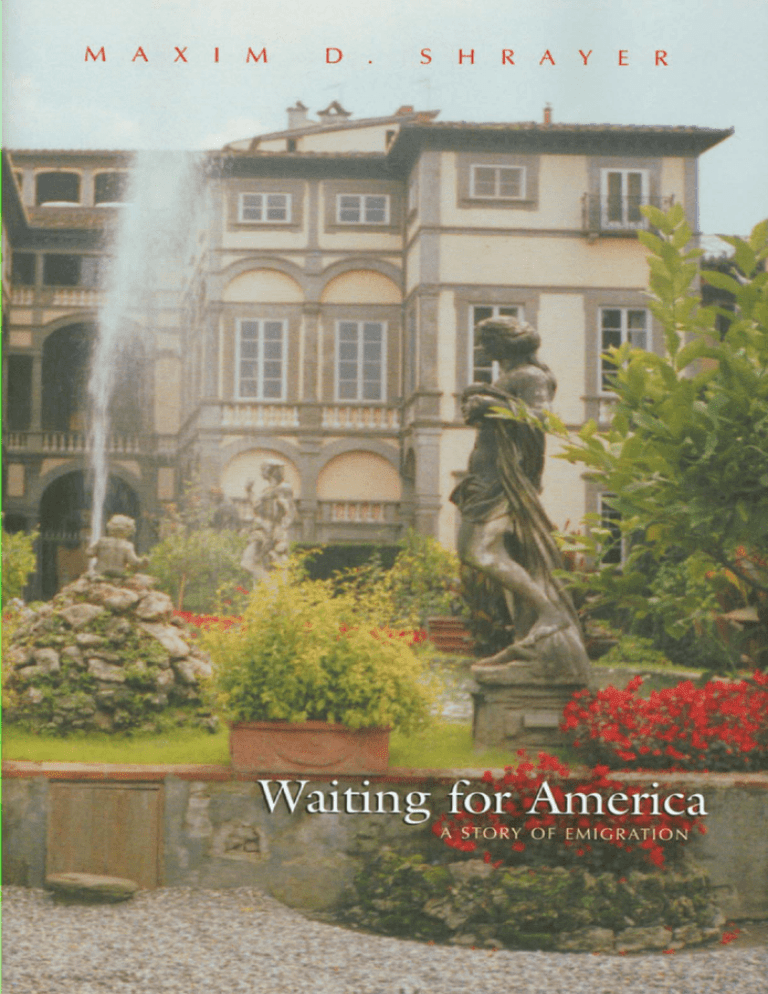
Waiting for'America A STORY OF EMIGRATION Maxim D. Shrayer qEJd X U Syracuse University Press Syracuse University Press, Syracuse, New York 13244-5160 Copyright 02007 by Maxim D. Shtayer Individual scctions copyright0 1998,1999,2002,2003, 200? by Maxim D. Shraycr. All r k h t ~rerewed u'orld~tt,de,i,,<ludi,,x elertm!,it. First Edjtion 2007 07 08 09 10 11 12 6 5 4 3 2 1 The paper used in this publication meets the minimum tequirements of Ametiean National Srandatd fut Infutmatiun Scicnccs-Petmanence of Paper fot Printcd Libraty Materials, ANSI Zi9.48-1984.00TM Fur a list in^ of books published and dirttibuted by Syracuse Univetsity Prcss, visir our Web site at SyracuseUniversityPress.syr.edu. Library of Congress Cataloging-in-Publication Data Shrayer,Maxim, 1967Vl'aiting for America : a story ofemigration / Maxim D. Shrayer. - 1st ed. 2007. p, cm. ISBN 978-0-8156-0893-6 (hardback : alk. paper) 1 . Immigtants-United States. 2. Jews-United States. 1. Title. PG3487.R34U'35 2007 81V.603-dc22 2007031391 Mmu/oiit~~red it, the United Steta o/Arnerirr? hcknowledgmmts Preface PA 1 xi R T oN E : I ix Flight 1. Wienerwald 1 3 2. The Manchurian Trunk 3. Rome, Open City 1 1 36 52 I 4. Notes from a Life in Transit 1 5. Rafaella's Rusty Mustang INTERLUDE 10s I :The Roubenis of Esfahan I 6. The Rabhi and the Pastor I 7. Napoleon at San Marino I N TER LuDE 75 1 r N T E R I. u 13 E : La I33 IS7 : Literature is Love 8. Uncle Pinya, Visiting 1 1 178 186 Famiglia Soloveitchik 9. Refuge in Paradise 125 215 I ro8 Wienerwald In early June 1987, two days after I turned twenty, my tamily left the Soviet Union for good. We'd been trying to emigrate for nine years, struggling, losing hope, and regaining hope. I was ten when my parents decided to emigrate, and I was a junior in college by the time we were finally leaving. It rained during our last night in Moscow, and as my parents and I walked out of our former apartment building early in the morning, the streets and sidewalks lay under a blanket of poplar fuzz, a Russian summer snow. We rode to the airport in a black BMW with diplomatic license plates. Our friend and protector, a cultural affairs officer at the American Embassy, personally d n ~ v eus to Sheremetyevo-2, Rloscou~'~ international airport, and delivered us to the terminal. This was done to safeguard my parents and me from any surprises that the KGB was saving for the last. In the midst of airport chaos I said goodbye-forever, I thought at the time-to my whole world. Traveling with us were my grandmother, my mother's younger, divorced sister, and her eleven-year-old daughter. My grandmother was a robust blue-eyed seventy-threeyear-old widow with wavv amber-dyed hair. In her coriander skirt and blouse of a pale tulip yellow silk, my grandmother looked a lot younger than her Soviet age. With both hands she clung to an oversized brown leather purse. In Moscow my grandmother, aunt, and little cousin had always shared an apartment and formed a nuclear family. Now they were the first to go through customs. A tall female sergeant, who in another life might have been cutting women's hair in the antechambers of concentration camps, separated mv grandmother from her daughter and granddaughter and led her away for a "personal inspection." At this point my little cousin, as if realizing the finality of our leaving, started bawling, smearing large tears across her high cheeks and frenetically waving over the divide to her father, my aunt's long-divorced husband, who was staying in Russia with his new family. It was impossible to watch this innocent creature in a polka-dot dress, with pale curls sheared like those of a little lamb, say goodbye forever to her own father. I was almost glad to be summoned over to the customs booth. "Where you going, pal?" a leery customs lieutenant asked me as he strangled my blue backpack into submission. "Down south or to the States?" I didn't answer and looked down at my new shiny black wingtips, pretending that I wasn't sure what the lieutenant was asking. Of course I knew that "down south" referred to Israel and was meant to provoke me. I was a different person back then, in June of 1987, when I was leaving Russia for good. I was braver, more brazen, more desperate, but also less sensitive, less tolerant, and much more judgmental. I was accustomed to finding antlsemitic behavior everywhere and was ready to defend my honor with fists. I sincerely believed Ronald Reagan was good because he fiercely opposed the "evil" Soviet Empire. I was thinner and looked lankier with a full head of hair that I cut short and wore straight down over the brow, a la jejune Pasternak. I was also generously self-absorbed. "What's in your pockets?" the customs lieutenant asked, growing impatient with my defiant silence. One by one, I emptied onto the counter the contents of all the pockets of my new glen pla~dswt. They included a small leather-bound notebook where I jotted down lines for future poems, a tape measure, two handkerchiefs, a treasured roll of color film, and a chocolate bar someone had just given me at the airport. My nice suit was a present that my father's Uncle Pinya had mailed from Israel. Mother, father, and I were dressed in our finest clothes and wanted to look our best as we entered a new life. After we had passed through customs and then through the turnstile of Soviet passport control, we lingered and marched in place, taking one more and yet another glance at the small crowd of friends and relatives who were seeing us off. There they were, my dear friends, a magic circle broken: Misha Zaychik, growing his tirst sandstone beard; Tanya Apraksina, with her stupendous legs and ballerina posture; Alik Frayerman, a Levantine live wire under normal circumstances but now frozen with stupor; Lenochka Borisova, with mascara bleeding along her Slavic cheekbones; the phlegmatic aristocrat Fedya Bogolepov, fishing for a handkerchief in the fathoms of his corduroy jacket; Lana Bernshteyn, with her Jugendstil haircut, perfectly chiseled nose, and refined hands. No girlfriend was seeing me off; at the time we didn't have girlfriends or boyfriends in the American sense of the word, only girls or boys we dated now and then. Lana Bernshteyn had been my first love, never my "girlfriend." Some of my dearest people were now standing on that side of the turnstile, waving. Will 1 ever see them again? I thought as an Aeroflot steward escorted us to the empty first class lounge. \Ye were flying first class because it had been much easier to get the tickets, and after nine years of living in refuseniks' limbo, we didn't want to stay in Russia even for an extra day. I n English, the term rejkretzik corresponds to the Russian word otku7nik and means "one who was refused, denied permission" to leave the Soviet Union. But in its English rendition, the term has acquired an ambiguity, whose irony was hardly intentional: The Soviet authorities, not the Jews, were refirsing. The only thing refuseniks themselves had refused was a ticket to Soviet paradise. While we waited in the first class lounge for our drinks and a tray with black caviar canapks, my mother and father hugged me feverishly. My mother sipped her tonic and shivered, fighting back tears. "Are you cold? Do you want my jacket?" my father asked her. "Wait, I can't speak," mother whispered, resting her head on my father's shoulder and fumbling for a cigarette and matches in her suede purse. At forty-seven, my mother had ash-gold hair; later, from unremembering the Soviet past, her hair would succumb to quicksilver. In summer, my mother's straight, thick hair would grow wavy and pale, ~ ~ almost blonde, and her large blue eyes, piercingly perceptive, ever ready , be saturated with aquamarine to laugh and humor and s u b ~ e r twould blueness-a miracle of water, salt, and sun. But the salt in her eyes now came from withheld tears, and the luster was from sleeplessness and the fluorescent lights of the first class lounge. "We got you out, son. Finally we got you out," said my father. A strange mixture of shrewdness, ferocity, distrust, and nayvete lurked in his bloodshot, gray-green eyes, framed by his rectangular tortoiseshell glasses. Father couldn't sleep the night before we left hfoscow and walked around our neighborhood until dawn, saying goodbye. And with breakfast father had had some cognac with his good friend, the poet G. S., who came over to bid us farewell. hly long-limbed father, a former athlete, was tifty-one at the time. An American TV journalist who had interviewed my parents in Afoscow and later stayed in touch told me many years later that my father looked younger at sixty-one than at fifty-one. Over a rear before our leaving, father had suffered a heart attack from two months of being hunted by the KGB-after a novel of his had come out abroad. The wounds of his heart had healed, but the memories were healing more slowly. That morning in the airport, to look his best, my father was wearing a navy sport coat of the sort that we used to call "club jacket" after some forgotten British fashion, gray gabardine pants, and cordovan shoes. O n his knees he held a black and brown briefcase with all our papers. "\Ye got you out," father repeated, and he kissed me and my mother o n our chins, noses, temples, like a blind person missing lips and cheeks. That was my family at the doorstep of the \Vest, unprepared, as we would soon discover, despite the !-ears of waiting, for what emigration held in store for us. Half an hour later we boarded an Ilvushin 86. The Aeroflot stewardesses, navy-clad creatures with movie star looks, no longer treated us as their own-as fellow subjects of the Soviet Empire. \Xrhich meant they treated us better. The "emigrants" in their e!-es were almost as good as Westerners and deserving of proper service. In the air flying over Ukraine and Czechoslovakia, my parents and I toasted with champagne our deliverance and yet waited anxiousl!- for the plane to touch down outside the boundaries of the Eastern Bloc. Our whole lives' belongings had been packed in five suitcases. Our proofs of identity were Soviet-issued exit visas with black-and-u-hite kenzied photos. We'd been stripped of our Soviet citizenship. R e f u s e ~ k s we had been, kept hostage by the state for nine !ears, and non- n-e became refugees, stateless persons 1oosel:- protected by international conventions. All we knew about our future was that we were l e a s bound for America. AIRPORT blue-gray , uniforms escorted our group ofi about twentyfive Soviet refugees to some concourse or hall (this part is a panicky blur), where we all stood, huddled together, waiting for the first separation. "To Israel? Anybody going to Israel?" a tall suntanned u-oman called out in Russian. She was a representative of the Israeli S i i n i s t ~ of Absorption and looked like a lady warrior. Dropping his briefcase, my father shuddered and ierked forward, unclasping his hands and unlocking his dry lips as though he wanted to motion to or say something to the Israeli u ~ ~ m aSLY n . mother gave him a scixnful look. "Please don't start again," she whispered, and her leaden whisper reached the ears of others in our small crowd ofrehgees. Waitingright next to us was another refugee, brmerh-3 cl.assicl; professor. His name was Xnatol!- Shtevnfeld. Back in 1980 he had lost his university position. hfy parents line\\- him superhciall!; the \\-a!- man!members of the hioscow refusenik communin kneu one another, and never particularly cared for him because of his chronic superciliousness. As a refusenik, Shteynfeld taught history in a night-extension school for factory workers. He was in his mid-forties and twice divorced. He left a teenage daughter in >loscou~.X polyglot, Shtei-nfeldwas maid\- known in the hloscow refusenik circles for two things .\lthough he had nerer set foot outside the Soviet he was said to be fluent in Endish: German, French, Italian, and Spanish. Shteynfeld's second claim to I N T H E VIEST fame was his closeness to a hloscow Russian Orthodox priest ofJewish origin, Father hl., who made it his life's work to convert to Christianity as many Jewish intellectuals and artists as there were crenellations on all of the Kremlin walls. Under Father M.'s influence, Shteynfeld was baptized some time in the late 1970s; later he began to spread among refuseniks the message that Jewish Christians were "doubly chosen" and supposedly fulfilled a double mission. Shteynfeld sported a Caesar cut and cultivated a disdainful pallor on his flabby cheeks and double chin. "Who would want togo to Israel?" Shteynfeld uttered,loud enough for our whole group of refugees to hear despite the competing noises of the terminal. "It's a police state." And he smirked. Like a bull who is shown a red rag, my father was incapable of ignoring Shteynfeld's poisonous remark. "Listen, Shteynfeld," my father said, swaying on the feet that still remembered the boxing rings of his youth. He had to stop boxing in medical school, when the doctors told him he u.ould otherwise go blind. "Listen, Shtevnfeld," father repeated, bringing his head and torso closer to Shteynfeld. "Where we all go is our personal business. But don't stand here besmirching Israel. Without Israel you'd still be teaching the French Revolution tr) a bunch of drunks and delinquents." hlother pulled father by the elbow of his club jacket. "Without your charming wife you'd be quite the Zionist, wouldn't you, hfr. IY'riter?" Shteynfeld said, bowing his oily chin. "'4nybody to Israel?" the Israeli Amazon asked, this time like a bartender announcing last call. "Ties, here," shouted a girl of about twenty, as she started vehemently waving at the Israeli woman. "Ken!" Ken means "yes" in Hebrew, and after our small crt~wdof Soviet refugees heard it, we split our ranks, leaving the girl and her family in the middle. The girl had been traveling from hloscow with her father, a veteran refusenik, and his younger, second wife and their two young children. The girl's mother had died of leukemia while they were re fuseniks, and the father remarried. "Well, papa," said the girl, taking her father's hands in hers. "Good luck with everything in America!" She kissed her father on the brow. Then she kissed her little half-brothers, but not her father's second wife. "Let's go, my dear," the Israeli woman said, putting her arm around the young Zionist. "You'll miss your connection to Tel Aviv." "Anya," the girl's father said imploringly and reached out his tottering hand, as if trying, for the last time, to dissuade her. 'lnechka, wait!" But the Israeli Amazon was already leading his daughter toward an aluminum door on the opposite side of the small concourse. "No one else-to Israel?" asked a skinny bald man who had materialized out of nowhere and was now standing in front of our group. Dressed in a white linen derby, yellow shirt, and white slacks, he looked about sixty and spoke a shtetl sort of Russian, not unlike that of my father's late auntie from Minsk, except more heavily Yiddish-accented and misstressed. O n the open palm of his left hand he held a leatherbound notebook, and he was tapping on it with a thick silver fountain pen. "Too hot for you down there?" The quick-eyed man gave all of us a collective wink and then removed a cap from his silver pen. "YL~ucan all hear me, right?" he asked, taking another step toward us. "Yes. can. Yes," came several voices from our group. "Su~ell.Slansky's my name," he said loudly, hissing on the sibilants like an old grass snake. "I work forJIAS, which stands for Jewish Immigrant Aid Society. I'm from Poland originally, from outside Warsaw. Me and my wife," and he turned his head to his left where a blonde lady of about fifty, dressed in a sequined blouse and a white skirt, swayed on high heels. "Her name is Basia. We've been here in Vienna for over twenty-five years, and we've been working for JIAS for almost as long. So don't worry, we'll get you started and deliver you to your hostels. You'll ask all the questions when we're riding from the airport. We have three minivans. I drive one, my lovely wife drives another one, and there's a Romanian guy, Popescu, who works with us. He also speaks Russian. So now, dear refugees, let's please get going. We need to collect your bags. There are bathrooms in the baggage-claim area." After the baggage was claimed, Slansky and his wife wrote down everyone's name and began to divide us into three groups of eight to ten. As the Slanskys animatedly discussed in Polish how to break us into groups according to the number of vacancies in the hostels and hotels for refugees, I began to inch my way out of the fog of cognitive paralysis into which I had sunk after stepping off the plane in Vienna. The Moscou.-Vienna flight had only lasted about three hours, but it amounted to a passage from being within the Soviet Bloc to being without it. During the first hours after the arrivalin Vienna, I felt numb and could barely talk or make eye contact with those around me. It sometimes happens that in the most shocking or heart-rending moments our memory shoots and stores irrelevant footage. My eyes came upon a group of six that stood out from the other Jewish departees. They waited like a family at a provincial photographer's studio of yore. In the center of the group was a smug-looking man in his late forties, wearing a black suit and an oversized woolen derby of the sort known in Russian as "airfield" and associated with men from the Caucasus; the broad collar of his striped cream shirt spread over the extra broad collar and lapel of the coat. A smoldering cigarette hung like a marionette out of the corner of his mouth. O n his arm the man in the oversized derby held a woman with lush black hair covered with a transparent kerchief of golden gauze. She wore a dress embroidered in gold thread and smiled in fits and starts. To their left stood a girl of about ten or eleven, already showing buds of femininity as young girls from the Middle East, Central Asia, and the Caucasus often do at that age. She held the hand of a young man who was also dressed in a black suit and sported a dark crimson tie. The girl looked like she was trying to tell the young man something funny, to get him to laugh or smile, but he just stood beside her, like a dummy, letting her play with his listless hand. His downcast eyes studied the marble squares of the terminal floor, still unlittered at this hour. O n his shoulder the young man had a narrow black carrying case with a zipper. To the right of the smoking man and the gilded woman, on an beat-up brown fiberglass suitcase, sat, arm in arm, a old couple of escapees from a museum of ethnography. The old man was in his seventies, sinuous and small, his face bristling with steel wire. O n his feet he had what looked to me like riding boots. Over a jacket the old man wore a belted coat of thick gray wool with rows of narrow long pockets for bullets stitched on either side of his chest. Coats like that are the traditional garb of men in the mi~untains of the Caucasus. Atop the head of the old warrior, a tall black astrakhan rose like a water tower over a small town's central square. The face of the old man reflected nothing but contempt for his surround~ngs,contempt with an admixture of fierceness and bravery. His goitrous wife, who clung to his side like a hen to her perch, had porcelain saucers for eyes and was clad in all black, except for her gauze kerchief, which had silver beads. Despite the obvious differences in temperament (which can sometimes overshadow the phenotvpical similarity), all three men in this family looked alike: shortish, with hc,oked noses, black wavy hair, and tyrannical eyebrows. Every now and then, the old man said someth~ngin a shrieky voice to his wife, in a language that sounded a bit like Tadjik. Father sensed my curiosity and explained: "Oh, they are Tats. Mountain Jews. They speak Tat, a Judeo-Iranian language." "Papa, how do you know all this?" I asked. "Well, I met some Tats in the military, and later in Azerbaijan, in the '60s. And I once translated a Tat poet, Kukullu, into Russian," he answered. Suddenly the young man with the narrow black case came up to me. Tenderlylaying his small hand on my elbow, he said, "Hello, friend, my name is Aleksandr. I'm from Baku, from the sunny Azerbaijan." I looked at the young musician without saying anything. "Friend, where are they taking us? D o you know?" "Some hotel, or hostel, or dormitory for refugees," 1 answered, without any intonation. "I've never lived in a dormitory," the young man said with passion. "Back home, in Baku, we had a grand apartment. Four rooms. You know, friend," he said looking me right in the eye, "I still don't understand why we left. There was never any prejudice against us in Baku. O r against anyone else. We all lived like brothers-Azeris, Jews, Armenians, Russians." By some strained effort I recalled reading in high school about massive anti-Armenian violence in Baku around 1900 to 1910, but I didn't feel like arguing with the homesick flautist. I just patted him on the back, lightly, and soon our family name was called. From the airport we rode in a long silver-blue van. Popescu had rolled his window down and tossed cigarette butts at the smooth surface of the freeway. Riding there with us were my grandmother, aunt, and cousin, as well as two complete strangers. One of them was Mrs. Perelman, a plump old lady who was on her way to Calgary to be reunited with her son and his family after eight years of living apart. She told us that her husband, an aeronautical engineer, had died in Russia without ever seeing his "Canadian" grandchildren. The other fellow traveler was a single man in his early thirties, a dentist with a thick Cossack mustache who told us that his girlfriend, an American of two years, was coming from St. Louis to meet him in Italy. All the while, as we drove out of the airport through lilac dusk striated with neon signs, the windswept dentist made comments like this: "Wow, that's what I call a highway!" O r this: "Everything looks so new and clean!" About thirty minutes later the van delivered us to a refugee hostel in the town of Gablitz, about five miles outside Vienna. The hostel was a three-story stucco building with balconies and a red roof. The owner, a sickly looking creature in her late forties, greeted the Romanian driver in German and signed some papers he placed on the reception counter. "This lady's name is Charlotte," the Romanian driver explained to us in his formidable Russian. "She runs this place. Very tough lady. No smile, all discipline. Like all of them here, you know." "How do we get in touch with you if there's an emergency?" asked the dentist. "What emergency?" Popescu replied, sneering. "Relax, my friend, you're in the free world." At the door he turned around and added, "Don't forget, tomorrow morning the Slanskys will come to take you to Vienna. The other families from your group are staying in the center of Vienna, so we don't need to drive them around. You get to stay in the country and we drive you around-it's a great deal." Charlotte the hostel proprietress was dressed in pink jeans and a white lacy blouse. She had sallow skin, unkempt hair, and a long waxen nose. "Long nose," I whispered to my mother in Russian. Barely acknowledging our presence, Charlotte studied her register for a couple of minutes. "You and you," she finally said, pointing her index finger at my parents. "No. 5." And she gave my Father a key. "You, you, and you," she pointed at my aunt, grandmother, and cousin. "All together. No. 12." "What about me?" I asked. "Yc>u." Long Nose brought her yellow finger close to my chin. "No. 17. Attic." We carried all of our luggage up the stairs and then hauled most of our relatives' luggage, except my aunt's very heavy trunk, which we left in a storage room on the ground floor. By the time we had finished supper, which was served in the dining room downstairs, we were all so exhausted that going - out to tour the environs of the hostel was out of the question. I don't even remember returning to my garret and falling asleep our arrival in Austria1 woke up and looked outside the narrow window of my garret. I saw the lush treetops of Wienerwald. In Soviet grade school I had soloed in a chorus performance, and the refrain was stuck in my memory: "The Vienna Woods (trala-la), the world of miracles (tra-la-la)." I showered in a hallway bath, dressed, and went out for a stroll. I passed a wine garden and a tiny post office. I followed the bends of a narrow roadway, eventually turning left onto a rural asphalt road veined with cracks. The road continued up a slope, past a deserted house with a gable roof and a large fruit orchard, also forsaken and grown wild. The gray tower of a distant castle showed through the verdure of beeches, oaks, and elms. A stork of an old gentleman dressed in a black three-piece suit, a white shirt with a crimson bow, and a Tyrolese hat, greeted me with a squeaky "Griiss Gott!" and stepped hack into his century. An oriole whistled its fluty song. A red doe crossed the road and vanished in the shady IN THE M O R N I N G AFTER

